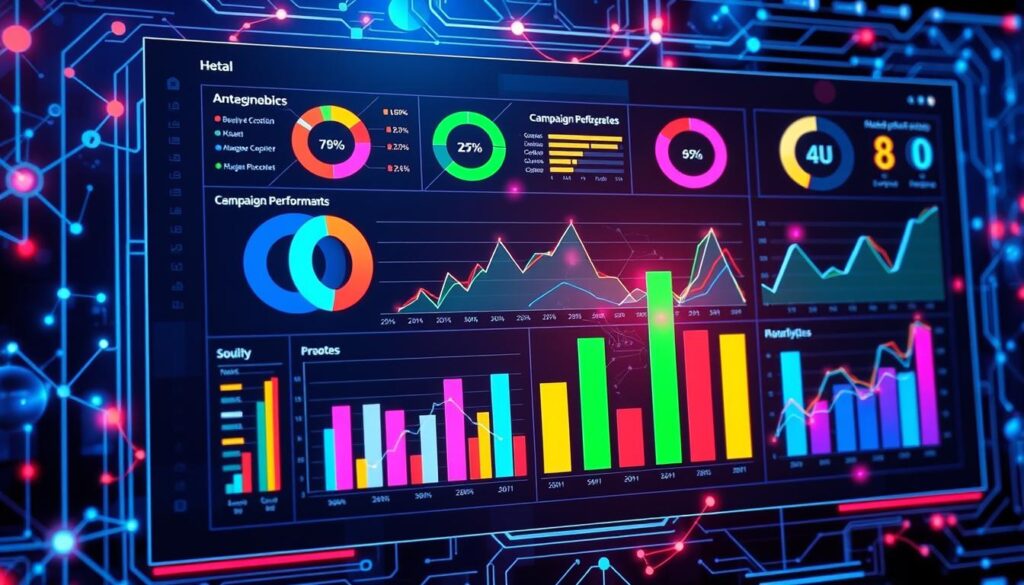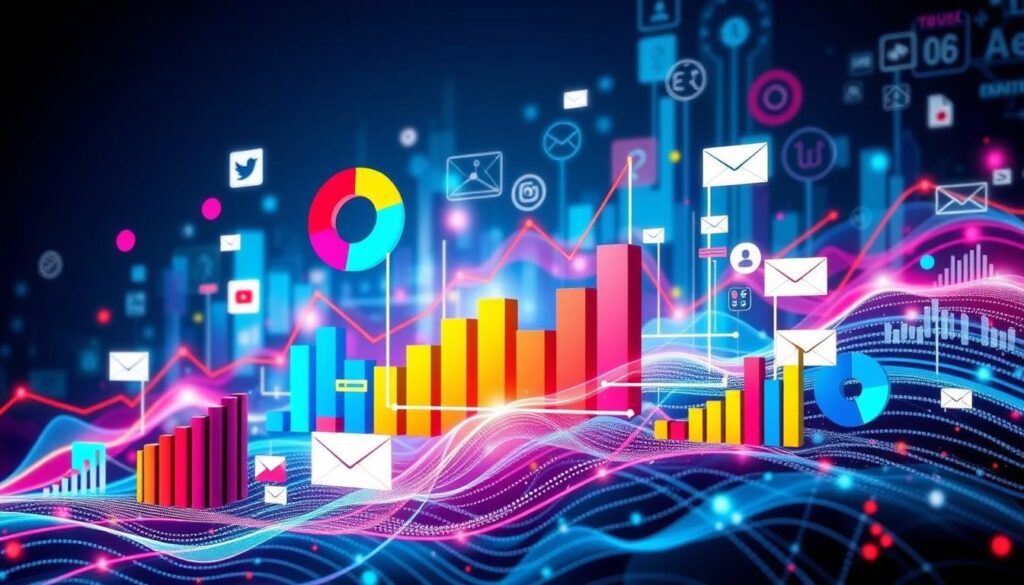Not long ago, marketing strategies were like shooting in the dark. There were big billboards, TV ads, and radio songs, all based on guesses. But now, thanks to data analytics, we can make informed decisions.
The world of business intelligence has changed everything. It has made it clear what really connects with people. This shift has made marketing more precise and effective.
Today, digital agency services are not just agencies. They are experts who turn data into powerful marketing strategies. These strategies shine a spotlight on businesses at the perfect moment.
Key Takeaways
- Embracing data analytics as the cornerstone of digital marketing.
- Understanding consumer behavior through rigorous data analysis.
- Enhancing marketing strategies with precise business intelligence.
- Employing real-time data for dynamic, impactful marketing decisions.
- Data-driven personalization as a beacon for higher conversion rates.
- The important role of KPIs in measuring and optimizing marketing effectiveness.
The Role of Data Analytics in Crafting Targeted Marketing Strategies
As a digital marketing strategist, I’ve seen how data analytics changes marketing. It helps capture and analyze demographic data from Google Analytics and social media insights. This lets businesses understand their customers better.
They can then talk directly to their audience. This makes marketing more effective and personal.
CRM systems play a big role in using this data. They mix technology with creativity to analyze customer behavior. This helps send messages that are both relevant and timely.
For example, a retail brand used analytics to change its online strategy. They saw a 50% increase in customer retention and a 30% boost in online sales in six months. A tech startup also used analytics to improve its product updates, doubling user engagement.
Marketing today is about more than just following trends. It’s about predicting them. Thanks to advanced analytics platforms, marketers can see trends coming. This gives them a competitive edge.
Tools like user-friendly dashboards and real-time reporting help share data insights. This ensures everyone knows where marketing is going. Data analytics shapes how and why marketing strategies are made.
In short, mastering data analytics is key for marketers. It helps them understand digital consumer interactions. This is crucial for creating targeted marketing strategies that really work.
The Impact of Machine Learning on Predictive Analytics for Marketing
Machine learning has changed how we use predictive analytics in marketing. It combines technology and marketing smarts to better understand consumer behavior and market trends. This helps businesses look ahead, not just react to the market.
Understanding Predictive Analytics and Machine Learning
Predictive analytics is key in today’s business world. It uses stats and machine learning to guess what might happen next. By looking at past data, it helps align marketing with what customers want. Tools like neural networks and decision trees help uncover hidden data patterns.
Real-World Applications: Predicting Consumer Behavior
Machine learning shines in predictive analytics for marketing. It guesses what customers will do and like. This lets marketers offer personalized stuff that boosts sales and keeps customers coming back. For example, linear regression models predict sales, helping businesses plan better.
Case Studies: Success Stories in Marketing Predictions
Looking at success stories, we see how machine learning improves customer groups. This makes ads more targeted and effective. For more on how companies use these tools, check out this article.
- Adaptability to Real-Time Changes: Machine learning adjusts to new data fast, keeping marketing on track.
- Enhancement of Customer Segmentation: Detailed data analysis creates accurate customer groups, improving marketing.
- Data Privacy and Regulation Compliance: Advanced analytics require careful handling of data to meet privacy laws.
In summary, machine learning in predictive analytics does more than automate tasks. It makes marketing smarter, more personal, and responsive. For more on using advanced analytics, see these resources.

How Data Analysis Enhances Customer Segmentation and Personalization
In today’s marketing world, creating personalized experiences is key. It’s not just a plus—it’s a must. I’ll explain how data-driven insights and advanced algorithms change the game in e-commerce and more.
About 60% of people are ready to share personal info for experiences that match their interests. This opens doors for marketers to use AI and analytics to personalize more. Companies can now predict and meet customer needs before they even know they need it.
Real-time personalization, powered by AI and data analytics, allows for the delivery of customized content so specific that it seems instinctively designed for every individual user.
AI looks at search histories and online actions to offer super-personalized experiences. Tools like IBM Watson and Adobe Experience Manager adjust to what you like in real-time. This makes shopping more personal and effective.
| Statistic | Impact |
|---|---|
| 60% of consumers willing to exchange data for personalized experiences | Direct input for AI to tailor online environments |
| Average 115% higher ROI from in-depth customer analytics | Affirms the fiscal efficacy of targeted marketing campaigns |
| Companies using customer analytics report 93% higher profits | Demonstrates the profitability of understanding and leveraging customer data |
| Personalization improves engagement, loyalty, and satisfaction | Enhanced customer lifetime value and reduced churn |
Numbers show how crucial data analysis is for personalized experiences. Tools like Google Analytics, Hotjar, and Marketo help marketers craft customer journeys that truly connect.
AI, machine learning, and data analytics change customer segmentation and marketing. This leads to better customer retention, higher engagement, and more profits. Personalization is the key to loyal customers and business growth.
Data Analytics: A Gateway to Measurable Marketing Outcomes
In today’s fast-paced world, data analytics is key for marketing success. It helps companies move from guessing to using data to make better decisions. This leads to better engagement, more conversions, and higher ROI.
Identifying Key Performance Indicators (KPIs)
Finding the right KPIs is essential for checking how well marketing campaigns are doing. Important KPIs like customer acquisition cost and engagement rates help marketers see what’s working and what’s not.
Real-Time Analytics for Agile Marketing Adjustments
Real-time analytics make marketing more agile. This lets businesses quickly adapt to changes in the market and customer behavior. It helps improve campaign performance and efficiency.
Benchmarking Success with Analytics Data
Using analytics data to benchmark against the industry and competitors is crucial. It shows where you’re doing well and where you need to improve.
By using data analysis, companies can better understand customer trends. This helps in making smarter decisions and boosting ROI. As the need for data experts grows, so does the role of data analytics in marketing.
Data-driven marketing is now a must for growing businesses. By using KPIs, real-time analytics, and benchmarking, companies can achieve lasting success.
Driving ROI: Budget Allocation Optimized by Analytics
In today’s digital marketing world, using data analytics to optimize budget is crucial. It’s not just nice to have; it’s essential for great ROI. Businesses can now allocate their marketing spend wisely, making sure every dollar counts.

Maximizing Marketing Spend Efficacy
Data analytics helps marketers find the most cost-effective strategies. This way, they can use their marketing budget more efficiently. By knowing which campaigns work and which don’t, they can move funds to better places.
This smart budgeting not only saves money but also makes campaigns more effective. It’s a win-win for everyone involved.
Analytics Tools for Budget Forecasting and Tracking
Good budget forecasting and tracking are key to successful campaigns. Analytics tools give a clear view of how money is spent and what’s gained. They help predict future needs and make smart investment decisions.
These tools provide detailed reports and up-to-date data. This helps marketers make informed choices, ensuring their investments are wise and well-planned.
Case Study: Cost-Efficient Campaigns Leveraging Analytics
An e-commerce company used customer segmentation analytics for targeted marketing. This approach boosted engagement and sales, showing the power of focused analytics. Such examples prove that smart budget management through data analytics can lead to big financial gains.
In many industries, companies with strong analytics systems for budgeting do better. They spend their marketing budget more efficiently and see higher profits. Real-time data analytics give deep insights, helping to optimize campaigns and make better decisions.
By planning ahead and adjusting strategies, businesses can achieve better returns on investment. This proactive approach leads to success and growth.
Deciphering Data Visualization for Marketer’s Advantage
In today’s fast-changing digital world, knowing data visualization is key for marketers. It helps turn complex data into stories that guide data-driven decision-making. Tools like Tableau, Google Data Studio, and new ones like Domo and Looker are crucial.
Using different types of data visualizations, from simple charts to detailed heat maps, helps us see trends and understand how people behave. For example, heat maps show where on websites people are most active.
| Visualization Tool | Utility in Marketing | Common Formats |
|---|---|---|
| Tableau | Analytics for campaign tracking | Bar charts, line graphs |
| Google Data Studio | Real-time performance monitoring | Pie charts, area charts |
| Domo | Trend analysis in consumer data | Heat maps, bubble charts |
Adding AI to data visualization makes it easier to understand and predict data. This helps make marketing strategies better before they start. Tools like monday.com with AI make data updates fast and cut down on mistakes.
This mix of predictive analytics and interactive dashboards makes traffic analysis and campaign monitoring better. It helps create strategies that can quickly change with the market.

But, there are big challenges. Like dealing with complex data and needing to keep learning new tech. Yet, using data visualization well can lead to better decisions and a strong competitive edge.
In short, for marketing pros wanting to improve their strategies, using advanced data visualization and AI is not just helpful. It’s essential for success in today’s data-driven world.
Integrating Artificial Intelligence in Digital Marketing Analytics
Artificial intelligence is changing digital marketing in big ways. It helps us use automated analytics better and turn big data into smart marketing choices. This is a game-changer.
AI-Driven Insights for Competitive Advantage
Marketing strategies powered by AI give a huge advantage. AI quickly sorts through data, letting marketers change plans fast. This keeps them ahead in fast-changing markets.
AI also makes analyzing customer feelings more accurate. It understands what people really think, helping create messages that connect better.
Automating Analytics with AI Tools
AI doesn’t just analyze; it automates. It makes quick work of big data, saving hours or days. AI helps predict what customers might buy next, helping businesses grow.
AI tools can even make data searches faster. They turn complex questions into simple data requests, making data easier to find.
Transforming Big Data into Intelligent Marketing Decisions
AI is great at making sense of big data. For example, it helps online stores change prices based on what customers are doing. This can lead to more sales.
AI also lets marketers adjust their campaigns quickly. This makes marketing efforts more effective, saving money and getting better results.
In short, AI in digital marketing is a total change. It turns data into smart marketing plans. As digital data grows, AI will be key in understanding it and making strategies that work.
Data Analytics: Enhancing Content Strategy for Digital Age
In today’s fast-changing digital world, using data analytics is crucial for improving content strategy. It helps marketers create content that really connects with their audience. This approach also boosts organic traffic and SEO efforts. Let’s explore how data analytics can change your content strategy.
Content Optimization Based on User Data Analysis
Businesses can find out which content works best by analyzing user data. They look at page views, time on page, and interaction rates. This helps them focus on making more of what their audience loves.
Understanding Audience Preferences through Analytics
Analytics tools give deep insights into what people like. This includes who they are and how they behave. Knowing this helps content creators make things that exactly match what their audience wants. This way, businesses can keep up with trends and stay relevant online.
Leveraging SEO Techniques with Data Insights
SEO is key to a good content strategy, and data analytics makes it better. By knowing which keywords bring in the most traffic, marketers can improve their SEO. Good SEO means more people see your content, which is vital for growing online.
Here’s a look at how different content types do in terms of engagement and SEO:
| Content Type | Average Engagement Rate | SEO Impact Score |
|---|---|---|
| How-To Guides | 7.2% | 85% |
| Infographics | 9.5% | 65% |
| Video Tutorials | 11.3% | 74% |
| Expert Interviews | 5.1% | 88% |
| Case Studies | 6.7% | 92% |
Adding data analytics to your content strategy is a continuous process. It needs constant improvement and trying new things. But the benefits—like better engagement, content that really speaks to your audience, and improved SEO—are all worth it.
Conclusion
Data analytics is key in digital marketing, not just a trend. It’s the foundation for businesses aiming for sustainable growth in a competitive digital landscape. By using data analysis, companies can better understand their marketing efforts. This helps them make smarter decisions and improve their results.
Statistics show the power of data-driven strategies. They can lead to better decision-making and more efficient use of resources. Businesses that use data analytics become more competitive and efficient. They also make their customers happier.
Looking ahead, technologies like artificial intelligence and machine learning will change how we use data. For those interested in this field, getting educated and trained is crucial. Data analytics is important in many industries, leading to success stories. I’m dedicated to helping your digital marketing succeed by using data analysis.
FAQ
How can data analytics improve my digital marketing success?
Data analytics gives you insights into what your customers like and do. This helps you make your marketing better. You can make your marketing more personal, use your budget wisely, and get a better return on your campaigns.
What type of customer information can be analyzed to craft targeted marketing strategies?
Businesses can look at many types of customer data. This includes who they are, what they do online, what they buy, and how they react to ads. Tools like Google Analytics and CRM systems help gather this data. This way, you can create detailed profiles of your customers for better marketing.
What is the role of machine learning in predictive analytics?
Machine learning uses lots of data to find patterns and predict what will happen next. In marketing, it helps with predictive analytics. This means you can guess what customers will do and what strategies will work best. This helps you plan your marketing better.
Can you give examples of successful predictive analytics in marketing?
Yes, many companies use predictive analytics to their advantage. For example, retailers use it to know when to stock up for holidays. Streaming services use it to suggest shows and movies based on what you’ve watched before. This makes your experience better and keeps you coming back.
How does data analysis facilitate customer personalization?
Data analysis helps you understand each customer’s journey. This lets you create content and offers that fit their interests and past actions. This makes it more likely they’ll engage with your brand, especially online.
Why are KPIs important in marketing?
KPIs, or Key Performance Indicators, measure how well your marketing is doing. They show you what works and what doesn’t. By tracking KPIs like how many people click on your ads, you can make your marketing better.
How does real-time analytics contribute to agile marketing adjustments?
Real-time analytics gives you data as it happens. This lets you change your marketing on the fly. You can adjust your ads or budget to get better results right away, not after the campaign is over.
What is data visualization and how does it benefit marketers?
Data visualization makes complex data easy to understand. It uses graphs and charts to show trends and patterns. This helps marketers make quick decisions and see how their campaigns are doing.
How does integrating AI into marketing analytics enhance decision-making?
AI makes data analysis faster and more accurate. It gives you insights and strategies in real-time. This saves time and helps you make better marketing decisions, giving you an edge over competitors.
In what ways can data analytics improve content strategy?
Data analytics shows you what content works best. It tells you what your audience likes and engages with. This helps you create better content and improve your SEO, making your content more visible online.
How does a data-driven approach assist in budget forecasting for marketing?
Analytics tools help you predict how much you’ll need for marketing. This lets you plan your budget better. You can focus on the most effective campaigns and avoid wasting money.
What are some case studies where analytics-optimized campaigns led to increased ROI?
Many companies have seen great results from using analytics in their marketing. For example, a fashion retailer might plan their ads to match the seasons. This leads to more sales and a better use of their budget.

